25 Zero Waste Travel Tips (Practical and Enjoyable)
As an Amazon Associate, Ecotero earns from qualifying purchases.
Having a completely zero waste travel experience can be a challenge.
Fortunately, zero waste travelling can be simple and it can be more than simply boycotting single-use plastics along the way.
To give you plenty of options, we contacted hundreds of recognized eco-friendly travel blogs for their best sustainable travel tips.
And in this article, we listed the zero waste travel tips they shared to us to help you have a memorable and Earth-friendly adventures.
Let’s dive right in!
1. Avoid air travels (whenever possible)
Carbon Dioxide (CO2) is one of the most common greenhouse gases contributing to global warming and climate change.
According to the European Environment Agency (EEA), an average passenger plane with 88 passengers will emit 285g CO2 (Carbon Dioxide) per kilometer – many times more than cars, trains, and other land vehicles.
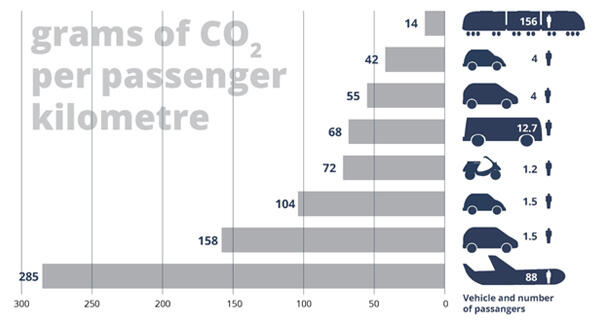
This is why when invited to speak at a UN climate conference, the young eco-warrior Greta Thunberg chose not to fly.
Instead, she choose to sail in a zero-emissions yacht from Sweden to New York to help reduce carbon dioxide emission.
Now, we are not recommending the extreme which will make yourself inconvenience, nor go out of your way to buy a zero-emission yacht too.
We are saying, if you’ve got an option, choose to go on a road trip rather than through air.
2. Book direct flights
There are some destinations where the most logical and practical way to reach is by means of planes.
So whenever you have no choice but to travel by air, book direct flights. Why?
Because planes emit most CO2 during taking off and landings.
Hence, the less time you board a plane, the less your carbon footprint is.

3. Go for a digital boarding pass
Most transportation today provides downloadable tickets and boarding passes.
When going on a travel, download your e-ticket on your phone rather than having it printed on a piece of paper that you’ll immediately throw away.
You’ll be able to reduce waste and also save paper, trees, and energy.
4. Buy “Carbon Offsets”
When you buy a “carbon offset,” the money you pay will be used to fund various programs and initiatives to help reduce greenhouse gas (GHG), and minimize air pollution.
Your money will be used to fund various environmental protection projects such as planting trees, restoring forests, research for cleaner fuels, etc.
The average carbon offsets selling price is anywhere between $10 and $25 per ton of carbon.
Where to buy carbon offsets?
When you book your ticket for a trip, ask the travel agency if they sell carbon offsets.
Also, more and more companies today are offering carbon offsets when you use their service or buy their products.
One company I know that buys carbon offsets is an eco-friendly bamboo clothing brand.
5. Book accommodations with kitchen/laundry access
To minimize waste in your destination, look for hostels, Airbnbs, and other vacation rental places where you can cook your meals and do the laundry.
This way, you won’t have to rely entirely on takeouts, fast foods, and packed lunches every time you need to eat.
As you may already know, takeout foods often comes in single-use plastic containers.
Moreover, you can also wash your clothes in your destinations using DIY laundry detergents so you won’t run out of clothes and resort to buying new ones.
Better yet, pack some of your zero waste laundry soaps for travel for convenience.
But what if you are staying in a hotel?
You can use the bathroom sink to wash your clothes.
You can also refuse housekeeping in your hotel by putting up the “Do Not Disturb” sign up whenever you leave your room.
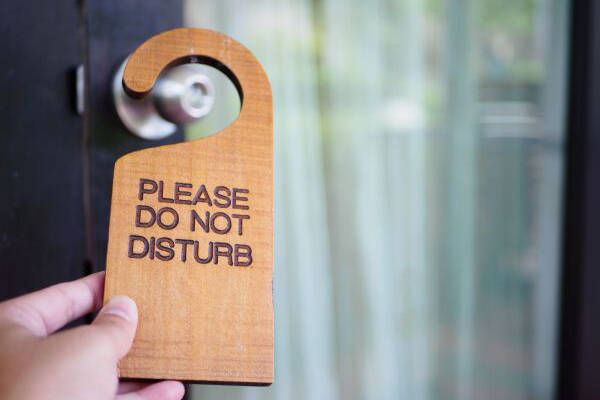
This way, your sheets won’t be washed every day which is a waste of water, soap, and electricity.
6. Travel light
Packing what you only need is good for the environment and saves you from carrying bulky and heavy bags.
As you may already know, vehicles need to burn more fuel to carry heavier loads, hence, more carbon emissions.
How to travel light?
Avoid bringing too much and unnecessary stuff by making a list of the essential things for your trip.
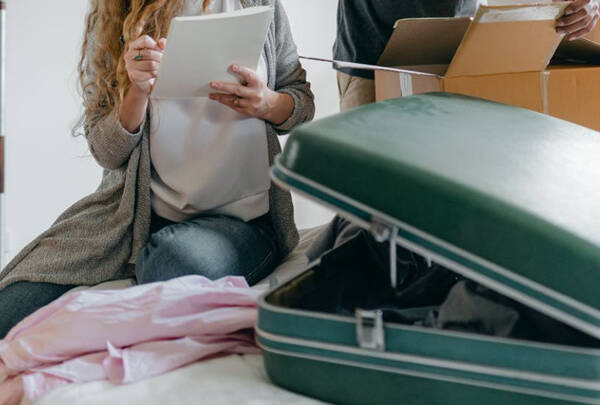
Then after you get them ready to pack, take another closer look.
If you see something that you can make do without, don’t bring it. For instance, most things you don’t wear or use daily probably shouldn’t be in your bag.
We often have a mentality that it’s better to have it and not need it when we travel.
Unfortunately, many things we pack on a trip will remain in our bag untouched until we get home.
7. Prioritize effficient and multi-purpose travel items
Items that can be used in multiple ways will save a lot of space in your carry-on.
For instance, a scarf that can be used as a blanket, or a sweater that can be a pillow, are items you want to carry with you.
Instead of carrying a spoon and a fork, bring a spork.
And did you know that baking soda can be used as a toothpaste, shampoo, deodorant, and laundry detergent?
If you have a baby, carry a swaddle blanket you can use as a wipe or burp cloth.
8. Use cloth or biodegradable diapers
Speaking of babies, what diaper is your kid using?
You can save money and lessen your waste during your trip if you’re willing to switch to cloth diapers for your little kid.
Cloth diapers can be washed and reused again. Hence, you produce fewer wastes and have less expenses.
However, we understand that most people wouldn’t want to spend time washing soiled cloth diapers on vacation.
There’s also the issue of how you’re going to dry cloth diapers, especially if you’re staying in a hotel.
So if you have no choice but use disposable diapers on a trip, buy biodegradable diapers.
Biodegradable diapers decomposes much faster than typical diapers.
9. Prioritize black, white, tan, and grey colored clothes
Lauren Singer of Trash is for Tossers suggests that you should prioritize packing black, white, tan, and gray-colored clothing.
Why?
Because these colors complement each other nicely.
Meaning, you can wear any of them in different combinations, and you can maximize the number of outfits you can wear with the least amount of clothes.
She also recommended bringing layering clothing such as plain thin shirts or sleeveless shirts that can be worn underneath a sweater.
10. Wear your bulkiest clothes on trip
Wear the bulkiest clothes on the day of your trip to free more space in your bags.
You can also wear other accessories like your jacket, scarf, sweater, sunglasses, etc., so they won’t have to take up space in your belongings.
11. Carry menstrual cups and reusable cloth pads
For women traveling during their time of the month, menstrual cups and waterproofed sanitary cloth pads can help you enjoy your trip while being kind to the environment.
12. Pack reusable cutleries
You will have to eat.
And in most cases, the cutlery you’ll be using when you’re away from the hotel or the house you’re staying in depends on what the store or the restaurant will provide.
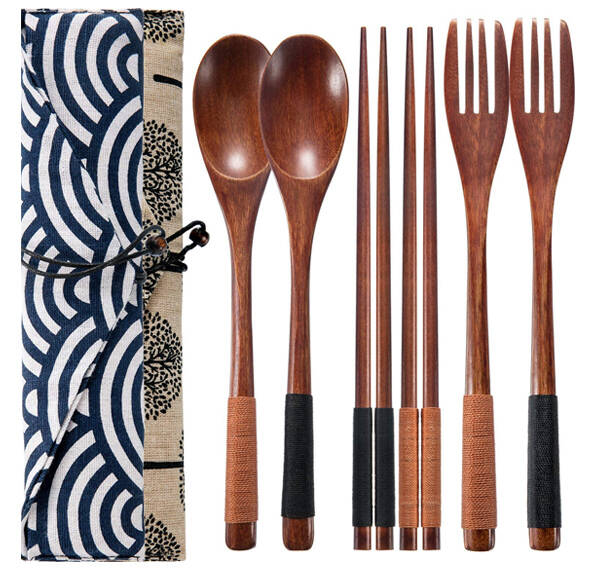
By carrying your bamboo, wood, or stainless cutleries, you can avoid using single-use plastic spoons, forks, and straws that end up in landfills (or in the ocean).
13. Pack eco-friendly toiletries
These zero waste travel tips wouldn’t be complete without us telling you to stay away from plastic toiletries.
Instead of packing a plastic toothbrush, get a bamboo toothbrush.
Get a reusable razor instead of a disposable one.
Furthermore, you don’t need to buy a new tube of toothpaste or sachets of shampoo for your trip.
You can pack some of the products you are already using in your home and put them in small non-plastic containers to avoid more waste.
Alternatively, you can make your toiletry products and carry them with you on your trip.
For example, here’s a zero waste DIY toothpaste ingredient from Lauren Singer.
14. Bring a reusable water bottle
Plastic water bottles are one of the most common plastic trash today. So make sure to carry a reusable water bottle during your trip.
If you’re traveling by road or by sea, you can fill your water bottle before leaving the house.
But if you’re traveling on air, keep it empty until the security inspection, and then you can fill it up before boarding your flight.
And if you’re a coffee person, you can also bring a reusable coffee cup with a lid.
You can order coffee while on the trip and tell the store attendant that you will be using your own cup instead of the paper or plastic ones they have.
15. Pack snacks for the trip
Packaged food mostly comes in single-use plastic wrappers. So aside from costing you money, they also cause a lot of harm to our environment.
So before your trip, prepare some zero waste travel snacks for yourself or your family.
You can bake cookies, pastries, or prepare sandwiches and put them in a reusable food container.
16. Take care of perishable goods at home
Before your travels even begin, you can reduce your waste at home by getting rid of food that might spoil while you’re away.
Ensure that you don’t leave any meat, fruits, veggies, and dairy products that might go bad.
If you do have them, we recommend that you start consuming them 2-3 days before your trip.
17. Unplug home appliances
While you’re on a trip, save electricity and money by making sure that your appliances are turned off before you leave.
And don’t simply turn them off, it’s best if you unplug them. Appliances still consume electricity when plugged in even when turned off.
This is also an excellent way to prevent fire accidents in case of power surges and shortages.
But this is on a case to case basis.
For instance, if you live in a sketchy neighborhood, you might want to leave your porch and security light on for your protection.
Furthermore, it would be best if you leave the heater running during winter to avoid pipe damages.
You can set it to the lowest possible temperature, just enough that the pipes don’t freeze.
18. Bring a reusable shopping bag
Another excellent zero waste travel tip that will come in handy wherever you go is to pack a reusable shopping bag with you.
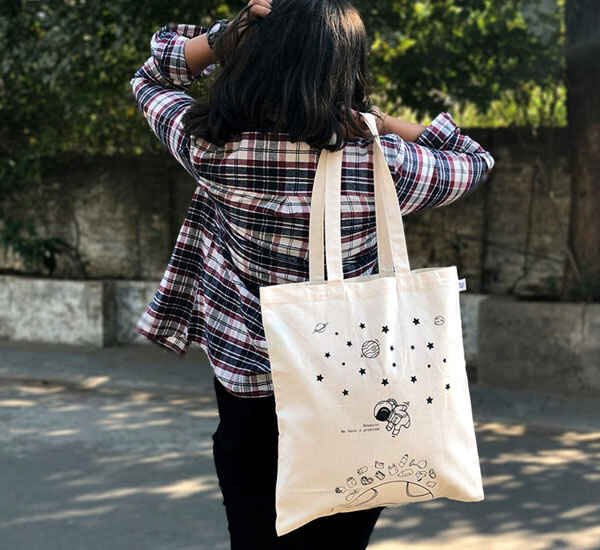
Reusable shopping bags made of cloth can be conveniently slipped between your clothes or folded into smaller sizes.
Then when you reach your destination, you can use it when you’re shopping or picking up supplies.
19. Avoid single-use plastics as much as you can
As much as possible, avoid using plastic straws, napkins, plastic cups, plastic cutlery, and other disposable items during your trip.
For example, in planes, try not to use the blankets as they are often wrapped with disposable plastic.
If you need to buy a beverage, get the ones that come in aluminum cans that you can recycle later.
Unless, of course, you have no other option.
20. Rent bikes or walk around
In your destination, check if there are bike rental shops near you.
Once you’ve gotten yourself familiar with the place and made sure that it is safe, rent a bike and use it to pick up supplies.
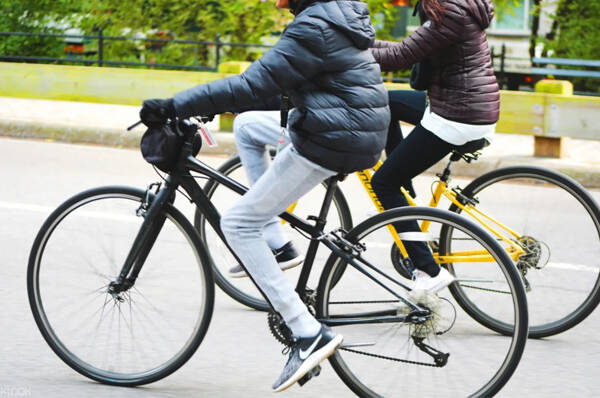
You can use the same bike when checking out local tourist spots instead of calling an Uber.
You can also just take a walk around if the place you’re going to isn’t that far.
These are all excellent ways to minimize carbon emission and can be a good bonding experience if you’re traveling with someone.
Besides their eco-friendly benefits, biking and walking is also an excellent way to connect to the locals and get a closer look at their culture.
Something that is hard to accomplish when you’re always riding a rented car all the time.
21. Practice eco-friendly travel shopping
When getting supplies during your vacation, always look for plastic-free or eco-friendly options.
Instead of buying packed fruits and meat in malls, try to find a farmer’s market where you can get them package-free.
Then you can simply put the products in the reusable shopping bag you carry with you.
You can also buy more eco-friendly alternatives to the things you need during your stay.
If you need toilet paper, choose bamboo toilet paper instead of a regular one.
If you run out of toothpaste, shampoo, or soap, try to find the most eco-friendly products you can find.
- 15 Best Zero Waste Shampoo and Conditioners
- 12 Best Organic and Natural Body Washes
- Top 10 Best Bamboo Toilet Papers
22. Say No to paper receipts
Unless you’re getting audited for your trip, you can say no to paper receipts when buying supplies, paying for food, or when getting souvenirs.
This is a good way to cut back on unnecessary waste and usage of tree products and energy.
23. Buy zero waste or eco-friendly souvenirs
It’s only natural to want something as a remembrance of our trip.
But whenever possible, try to get a trip souvenir that is actually useful and not just for the sake of sentimental value.
For example, a shirt is a souvenir that you can use and far better than keychains and other mementos that you’ll throw away.
Better yet, focus on taking pictures of the best places you’ve been to during your trip.
You’ll have good remembrance of your journey without producing any waste.
24. Make use of local recycling and compost programs
In an interview, Nathen and Josy of Responsible Van Life talk about how they make use of public recycling receptacles and local recycling stations whenever they stay in a new place.
Nathen and Josy are a well-known couple among eco-conscious people as they are enjoying a sustainable and zero waste lifestyle by living in a van.
You can follow in their footsteps and ask some locals where you can deposit your compostable and recyclable trash.
25. Pick up (not throw) trash whenever you can
And the final zero waste travel tip we can impart with you is this…
While more and more people like you are trying to live a zero-waste lifestyle, many people aren’t as passionate.
So during your travels, there’s a good chance that you can always find a candy wrapper, a plastic cup, and other waste lying on the ground.
But whenever you can, pick the trash you find and put them in the appropriate trash bins.
This way, you are not only helping reduce your waste during your travel, but you’re also helping with the proper disposal of other people’s trash.
Final thoughts on zero waste travel
Who wouldn’t want to travel and explore the world?
But wouldn’t it be amazing if realizing our life’s bucket list won’t come at the expense of our planet?
With these zero waste travel tips, we hope that we have given you enough information on how you can enjoy your travels without causing a lot of harm to our mother Earth.
And before we end, we would like to share something that Bea Johnson from Zero Waste Home said during her TED Talk.
She said, “Zero waste isn’t about recycling more, but less.”
It’s not all about reducing the amount of waste you throw, but how not to create any waste at all.
